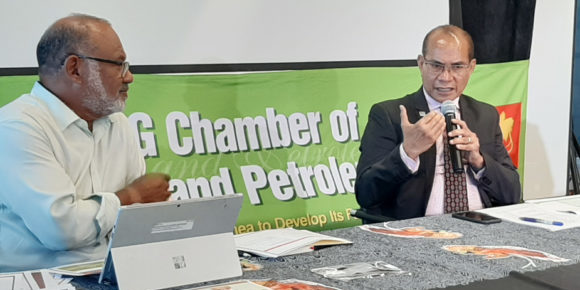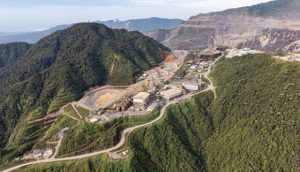The contribution of the resources sector to Papua New Guinea is being greatly under-estimated according to Maygen Turliu, Director of Tax & Business Services for Deloitte PNG. What appears in Treasury’s Budget is less than a third of its actual contribution, she says.

The Business Council of PNG’s David Toua and the PNG Chamber of Mines and Petroleum’s Richard Kassman [right]. Credit: PNG Chamber of Mines and Petroleum
‘The EITI has reported various other revenue streams that came direct from the sector. We wanted to paint a picture where it is not only [what is] reported in the budget. There are other revenue streams that come from the industry. This amounted up to K9.8 billion which is very different to what is reported.’
Turliu said the figure often used in the Budget is corporate income tax and salary and wages tax. She detailed areas in the EITI report which do not appear in the Budget papers. They include:
- Mineral Resource Authority fees, K4 million
- Licence fees, K2.66 million
- Share of mineral sales, K5.9 billion
- Dividend withholding tax, K287,000
- Management fees, K4.6 million
- Royalty withholding tax, K1.6 million
- Interest withholding tax, K10.3 million
- Business payments withholding tax, K5.4 million
- Goods and services tax (GST), K34 million
- Environmental permit fees, K7 million
Turliu estimated that the total contribution by the sector in 2018 was K1.53 billion.
Sector contribution a ‘misconception’
Richard Kassman, Vice-President of the PNG Chamber of Mines and Petroleum, said it was crucial that the government has a ‘good appreciation exactly what that take is’ and not just look at the Treasury accounts.
‘It is important for the State to appreciate the full picture,’ he said, adding that it is the only way the ‘real multiplier’ effect (economic activity multiplying into other sectors) can be understood.
‘There is a misconception of a very low percentage [contribution of the resource sector to government finances],’ Kassman said. ‘In fact, in our discussions with state they have said that our contribution is closer to seven per cent. But it is up to about 26 per cent.’
‘What it is showing is that the board of Kumul Petroleum is making decisions to pay a dividend, but it also holds the balance of that income received in its own account.’
‘[Of] course members of parliament, the bureaucracy and the general public, if that is the information they have in front of them, I can understand why there is a lot of anxiety and anger about the take. But the facts are that it is closer to 26 per cent. This [misunderstanding] is unfortunately driving action, which is to review mining and petroleum legislation – and it is behind the [proposed] tax rewrite.’
Share of sale
Kassman said a large share of the mineral sales in the sector goes into Kumul Holdings and Ok Tedi. He noted that they pay dividends to the state, but also retain revenue themselves.
‘As businesses, they are at liberty to hold the revenue there. What it is showing is that the board of Kumul Petroleum is making decisions to pay a dividend, but it also holds the balance of that income received in its own account.
‘When [Kumul] does that, the balance is not recorded in Treasury. So when you are reading the accounts you think: “Is that all we got?” when, in actual fact, the accounts show that the share of sales for Kumul and Ok Tedi was close to K5.9 billion.’









Speak Your Mind